Muhsin Al-Ramli's Blog
March 3, 2025
Entrevista con el escritor iraquí Muhsin Al-Ramli
El novelista Muhsin Al-Ramli:
“La literatura es un testigo de lo que sucede y un defensor detodas las causas justas”

El escritor iraquí-español transmite con su pluma una profundaexperiencia humana. En esta entrevista, habla de sus inicios literarios, lasinfluencias de la migración y el secreto de la perdurabilidad de las obrasliterarias a través del tiempo.
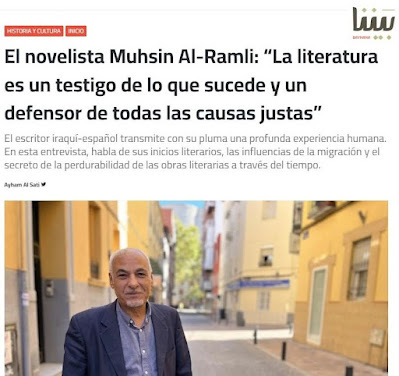
Por:Ayham Al Sati
El“dolor humano» es lo que fluye en los libros del escritor y novelistairaquí-español Muhsin Al-Ramli, quien narra sobre «la guerra, la dictadura, lafamilia, el amor, la migración, el exilio, la diversidad cultural, la crueldady la belleza». Porta en su pluma un rico legado y una experiencia humanaprofunda. Nació en Sudaira, un pueblo al norte de Irak, y reside en Españadesde 1995. Se graduó en Filología Hispánica en la Universidad de Bagdad en1989 y obtuvo un doctorado de la Universidad Autónoma de Madrid.
Comenzóa escribir desde temprana edad, alentado por su hermano Hassan Mutlak, escritory poeta apodado «el Lorca iraquí», quien fue ejecutado por el régimen de SaddamHussein en 1990. El asesinato de su hermano y la persecución política truncaronsu trayectoria durante un tiempo, obligándolo a abandonar Irak hacia Jordania yluego a España, donde vive desde entonces. Muhsin Al-Ramli cuenta con más deveinte libros que abarcan una variedad de géneros, incluyendo novelas, cuentos,poesía, teatro y traducción.
Nosrecibió Muhsin Al-Ramli en la estación del Cuatro Caminos, en Madrid, dondereside, con un abrazo y un espíritu lleno de humildad. Nos llevó a caminar porlas calles de su barrio antes de dirigirnos a su casa, que se ha transformadoen una biblioteca. En esta conversación, profundizamos sobre sus inicios, lostemas que prefiere tratar en sus novelas, su relación con la literaturaespañola y cómo una novela puede cambiar el rumbo de una vida, así como elimpacto de la migración en la vida de un escritor. También abordamos laimportancia de explorar este tema, así como las causas grandes y justas.Además, reflexionó sobre el valor de la literatura árabe en España, la españolaen el mundo árabe y el secreto detrás de la permanencia de algunas obras literariasmientras otras se desvanecen.
*¿Cómoempezó tu trayectoria literaria y qué o quién te inspiró a escribir? ¿Cuálesson las principales influencias en tus obras: tu origen migrante oiraquí?
Empecéa escribir literatura a los 12 años. Mi padre era un hombre religioso (mullah)y un hombre de clan (sheikh), que aprendió a leer y escribir por sí mismo, y mihermano Hassan Mutlak, quien más influyó en mi vida y en mi literatura, fuepintor y escritor y siempre seguí sus pasos, ya que comencé con el dibujo,luego la poesía, luego el teatro, luego los cuentos y las novelas. Mi hermanofue quien me animó y cuidó en este asunto, y publiqué algunos textos enperiódicos iraquíes cuando estaba en la universidad, publiqué algunos textos enperiódicos iraquíes cuando estaba en la universidad, pero tras la ejecución enla horca de mi hermano Hassan Mutlak en 1990 me abstuve de publicar y además,se me prohibió hacerlo. Abandoné el país después de las restricciones que meimponían a mí a mi familia y a todo el país, mientras la ferocidad del dictadory la ferocidad del asedio se intensificaban a la vez. Supresión de todo tipo delibertades y sufrimiento de todo tipo. Me citaban mensualmente para una investigaciónde seguridad, incluso cuando todo el tiempo era solo un soldado en el ejército,y me torturaban psicológicamente porque era un soldado en un ejército dirigidopor el asesino de mi hermano. Entonces, tan pronto como terminé de realizar miservicio militar, que duró tres años en la clase de armadura, dejé el paíshacia Jordania, y allí retomé la publicación, publiqué muchos textos y publiquémi primer libro. Después de dos años viviendo en Jordania, me mudé a España.
*¿Quétemas prefieres tratar en tus libros?
Eldolor humano. El ser humano con sus preocupaciones, sueños y relacionescomplejas consigo mismo, con los demás y con su entorno: guerra, dictadura,familia, amor, migración, exilio, diferencias culturales, crueldad y belleza.En general, tomo la mayoría de los temas de mis experiencias personales y delas personas que he conocido y con las que he convivido. Creo que un escritordebe ser testigo de su tiempo en todos sus aspectos.
*¿Cómofueron tus inicios en España y en la literatura española? ¿Qué papel desempeñóla cultura española en tu escritura?
Despuésde leer ‘Cien años de soledad’ en su traducción al árabe a principios de losaños ochenta, quedé fascinado. Decidí estudiar Filología Hispánica en laUniversidad de Bagdad para poder leer esa novela en su idioma original, a pesarde que estudiar español en Irak no ofrecía ningún futuro práctico. Así, elidioma y la literatura española transformaron mi vida, influyendo en mipensamiento, cultura, comportamiento y producción literaria. Al huir de Irak,preferí emigrar a España, aunque otros países ofrecían asilo político yhumanitario a los iraquíes en ese momento. Elegí España porque quería que miexilio fuera productivo y beneficioso para mí y mi cultura. Aquí completé midoctorado, a pesar de las dificultades económicas, burocráticas y psicológicasde los primeros años. Con el tiempo, eché raíces en España, formando una nuevafamilia: mis tres hijos nacieron aquí en Madrid.
*¿Quéte dio la migración y qué te quitó?
Medio mucho, especialmente seguridad y libertad, además de la oportunidad deinteractuar con otras culturas y conocerlas de cerca. Sin embargo, me quitó laposibilidad de vivir entre mi familia, mis amigos y mi tierra natal. Losprimeros años fueron difíciles y amargos, hasta que formé nuevas amistades yuna nueva familia, lo que aligeró parte de esa pérdida. Sin embargo, es difícilo imposible compensar lo perdido: muchos de mis familiares y amigos murierondurante mi ausencia, y todo cambió debido a las guerras y al terrorismo.
*¿Cómoves la literatura que trata el tema de la migración y la alienación? ¿Crees queescribir sobre el viaje migratorio o la etapa posterior a la llegada ayuda auna comprensión más profunda de la experiencia del exilio y la integración anuevas culturas?
Laliteratura escrita sobre la migración sigue siendo menos de lo que debería,especialmente en un tiempo en el que la migración se ha convertido en una delas grandes cuestiones y temas que presenciamos aumentar cada día, de modo quemillones son inmigrantes y viven en países distintos a aquellos en los quenacieron. Además, hay millones en el mundo que son hijos de inmigrantes. Por lotanto, considero esencial que aumente la cantidad de obras literarias yartísticas que aborden este fenómeno tan importante, comenzando por sus causas,pasando por las dificultades de sus caminos y el sufrimiento de sus comienzos,hasta llegar a sus resultados tanto en el individuo como en las comunidades. Nocabe duda de que la literatura iluminará muchos aspectos y detalles de estefenómeno que beneficia a todos y a la humanidad en general, ya que laliteratura y las artes son el mejor espejo en el que el ser humano puede versea sí mismo, ver al otro diferente y ver su entorno y su época. En lo personal,la literatura me ha enseñado cómo comprender al otro diferente y su cultura,cómo amarlo y amar su cultura, cómo interactuar con ella e incluso cómocontribuir a ella.
*¿Cómoves el papel de la literatura en el apoyo a causas justas como la causapalestina? ¿Cómo influyen los acontecimientos políticos y sociales en laliteratura?
Elpapel de la literatura es significativo en todo tiempo y lugar, aunque no tengaun impacto inmediato y directo como el de la política, la economía o los mediosde comunicación. Su influencia es más lenta, pero también más profunda. Laliteratura auténtica siempre se posiciona del lado de los débiles, loshumildes, los marginados, los oprimidos y los pobres, no del lado de lospoderosos, los opresores, los tiranos o los vencedores. La literatura está dellado de la víctima, no del verdugo. No apoya el derecho de la fuerza, sino lafuerza del derecho.
Laliteratura es un testigo de lo que sucede, un guardián de la memoria, undefensor de todas las causas justas y de los derechos humanos. Expone ladesinformación, las mentiras y las justificaciones falsas o manipuladas.Rechaza la violencia, la injusticia y el racismo. La literatura nos recuerdanuestra humanidad en todo momento, advirtiéndonos contra el dominio de nuestrolado más salvaje. Trabaja para afinar nuestra sensibilidad humana, fomentar laempatía y la compasión, y avanzar en la humanización del ser humano.
*Entu novela, Los jardines del presidente, uno de los tres personajes principales,Ibrahim Qisma, se encuentra trabajando en el entierro de cuerpos ejecutados.Hoy en Siria, tras la caída del régimen, se han descubierto cientos de fosascomunes de personas ejecutadas o asesinadas bajo tortura. Tal vez hay siriospiensen en tu novela al escuchar o ver lo que está sucediendo.
¿Quéopinas sobre esto? ¿Cómo puede un escritor ser un testigo fiel de las tragediasde su pueblo sin perder la esperanza o caer en el pesimismo? ¿Cuál es, en tuopinión, la responsabilidad de la literatura frente a estas atrocidades pararevelar su verdad?
Sí,el régimen dictatorial que cayó en Siria es un gemelo del régimen dictatorialque cayó antes en Irak; son prácticamente idénticos en todo. Ambos adoptaronuna ideología chovinista y sangrienta como herramienta para alcanzar el podermediante golpes de estado, recurrieron a la represión, el terror y ladestrucción, y consolidaron el poder familiar y personal a la fuerza.Destruyeron dos grandes países durante medio siglo. Por ello, no me sorprendenada de lo que se ha revelado sobre los crímenes del dictador sirio. Incluso heescuchado testimonios de personas que describen experiencias casi idénticas alas narradas por los personajes de Los jardines del presidente.
Encuanto a la literatura, su función es describir y diagnosticar, y eldiagnóstico es la mitad del camino hacia la cura. Por ello, no conduce a ladesesperanza; al contrario, señala dónde puede renacer el ser humano en mediode la destrucción y cómo lo humano puede prevalecer en su interior, a pesar delos intentos de aniquilarlo. La literatura describe, condena, advierte,consuela a las víctimas, y da voz a quienes no la tienen. En resumen, es untestimonio de su tiempo.
Estoyfeliz por la liberación de Siria de la dictadura, finalmente. He participado enla mayoría de las manifestaciones contra el régimen aquí en Madrid durante másde diez años, y espero que lo que venga sea mejor. Este hermoso y antiguo paísmerece todo lo bueno y algo mucho mejor siempre.
*Unavez dijiste en las redes sociales: “Cada año se escriben y publican cientos denovelas, pero solo unas pocas perduran”. ¿Cuál es el secreto detrás de quealgunas novelas trasciendan el tiempo, mientras que cientos desaparecen?
Labuena literatura, la auténtica, es aquella que se pone del lado del ser humano:lo consuela, dialoga con él, expresa sus dolores, esperanzas, libertades,derechos y preguntas existenciales. Además, lo guía hacia los lugares dondereside la belleza y la fealdad de la vida, y lo hace con profundidad yperspectiva. Esto en cuanto al contenido. En cuanto a la forma, una obra debeestar bien elaborada, con técnicas artísticas cuidadas, un estilo narrativosólido y una atención especial al lenguaje.
Encambio, las obras escritas rápidamente con el objetivo de obtener gananciasfáciles, seguir las modas, proporcionar un entretenimiento efímero, o quebuscan adoctrinar, engañar, o servir como herramientas de propaganda paraideologías, racismo, credos o la promoción del odio hacia lo diferente,desaparecerán rápidamente junto con esos objetivos oportunistas y temporales.
*¿Existeun mensaje general que el escritor Muhsin Al-Ramli intenta transmitir a travésde todas sus obras literarias? Si lo hay, ¿cuál es? Y si cada obra tiene supropio mensaje, ¿podrías darnos algunos ejemplos de tus trabajos?
Estaes una pregunta difícil, tanto para mí como para cualquier escritor. Sipudiéramos resumir nuestro mensaje en unas pocas palabras, no habríamos sentidola necesidad de dedicar nuestras vidas a escribir cientos de páginas. Por eso,la mejor manera de comprender estos mensajes es leyendo las obras mismas. Cadauna de ellas encierra más de un mensaje, y creo que vale la pena explorarlos.
Deentrada, invito a los lectores en español a leer mi novela, Losjardines del presidente. Ya que está disponible en todas las librerías yporque representa a mi gente, a mi pueblo y a mi país, Irak, más de lo que merepresenta a mí como individuo. Después de leerla, estoy seguro de que ellector se sentirá motivado por sí mismo a buscar mis otras obras y encontraráen ellas algo que le interese.
*¿Cómopercibes el interés de los lectores españoles por la literatura árabe? ¿Creesque hay un interés creciente en España? ¿Qué papel puede desempeñar latraducción en fomentar este interés?
Lamentablemente,el interés es débil, limitado y decepcionante, y no se corresponde en absolutocon la riqueza e importancia de la literatura árabe, tanto clásica comomoderna. La mayoría de los hispanohablantes la desconocen. El problema noreside en la traducción, ya que hay muchísimos traductores competentes entreambos idiomas. El verdadero problema radica en la escasez de editoriales que seinteresen por esta literatura, ya que la mayoría de los editores se guían porlas exigencias del mercado y las tendencias comerciales en lugar de apostar porcontenidos culturales diferentes.
Eleditor español suele ser localista y carece de audacia para explorar otrasliteraturas mundiales y seleccionar obras por iniciativa propia. Por ello, lopoco que se publica de literatura árabe suele estar traducido a partir de otrosidiomas europeos en los que ya ha tenido éxito, o bien aparece en editorialespequeñas y especializadas que carecen de los recursos necesarios para unaadecuada promoción, marketing y distribución.
*¿Yqué hay del interés de los árabes por la literatura en español? ¿Existe uninterés creciente por ella en el mundo árabe? ¿Cómo se puede fortalecer elintercambio literario entre ambas culturas?
Esexcelente, y contrasta totalmente con la situación de la traducción de laliteratura árabe al español. Desde los años ochenta, la traducción de laliteratura del español al árabe ha sido muy prolífica y bien recibida por loseditores árabes. Hoy en día, los editores y lectores árabes saben mucho mássobre la literatura y cultura escrita en español de lo que saben los editores ylectores españoles sobre la literatura y cultura árabe.
Sehan traducido la mayoría de las obras clásicas importantes y muchas obrascontemporáneas. Además, hay un seguimiento continuo de las novedades, hasta elpunto de que algunos libros se traducen y publican en árabe poco después de sulanzamiento en español. Este interés sigue en aumento.
Encuanto a cómo fortalecer el intercambio literario entre ambas culturas, existenmuchas vías. Principalmente, las grandes instituciones, tanto oficiales comoacadémicas y privadas, deberían participar en proyectos serios para apoyar latraducción, promoción y difusión de estas literaturas. No puede dependerúnicamente de esfuerzos individuales. Además, los editores y lectores de hablahispana deben mostrar más curiosidad, apertura y ganas de conocer lo que estámás allá de su cultura local y occidental.
*¿Estástrabajando en un nuevo proyecto literario? ¿Qué podemos esperar de tus futurasobras?
Sí,estoy trabajando en una novela en la que llevo mucho tiempo, pero no setermina. Tal vez sea la novela más difícil que he escrito hasta ahora, y esdiferente de mis obras anteriores porque incluye elementos de fantasía,mientras que mis novelas previas son realistas. Esta fantasía no es inventada,sino que está extraída de las historias populares que escuché de mi familiadurante mi infancia. Estas historias me marcaron profundamente, convirtiéndoseen parte de mi memoria, mi formación e incluso mi experiencia y visiónpersonal. Mi objetivo es preservarlas y, al mismo tiempo, revitalizarlas a mimanera, adaptándolas, explorándolas y recreándolas. Esta tarea es lo que haceque escribir esta obra sea especialmente desafiante.
Encuanto a mis futuras obras, imagino que, de forma natural, serán más maduras,profundas y variadas, gracias a la acumulación de conocimientos, la experienciavital y el paso del tiempo.
*¿Hayalguna pregunta que te gustaría que te hicieran, pero que rara vez te hacen?¿Cómo responderías?
Megustaría que un genio salido de la lámpara de Aladino me preguntara: “Pide dosdeseos, uno general y otro personal. ¿Qué deseas?”
Lerespondería: El deseo general: que termine la violencia y prevalezca la paz enel mundo.
El deseopersonal: tener tiempo suficiente para dedicarme exclusivamente a escribir ycompletar las obras que quiero antes de morir.
----------------------
*Publicado en la revista (Baynana), 28febrero2025Madrid
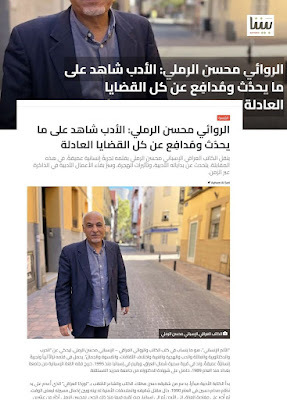
December 13, 2024
Syria, Libya, And a brutalised Iraq. The President’s Gardens/ Rashmee Roshan
Syria First? State of chaosor cohesion
A study on the country's defacto leaders. How Libya failed itself. And a brutalised Iraq
https://thisweekthosebooks.substack.com/p/syria-first-state-of-chaos-or-cohesion-iraq-libya

The President’s Gardens
By: Muhsin al-Ramli. Translated by Luke Leafgren
Publisher: MacLehose Press
Year: 2017
This take from Iraq is only partly fictional because theauthor’s brother was executed by Saddam in 1990.
The story is about an unnamed president, who is bothcapricious and cruel. Executions are commonplace. One of those who falls foulof the regime is Ibrahim ‘the fated’. His childhood friends – Tariq ‘thebefuddled’ and Abdullah ‘Kafka’ – reunite in grief over Ibrahim’s murder. Thenovel starts with dull-witted herdsman Ismail puzzling over nine banana crateson the roadside. But bananas were a rarity in Iraq because of a UN embargoimposed after Saddam’s 1990 invasion of Kuwait. The first line of the book setsthe tone: “In a land without bananas, the village awoke to nine banana crates,each containing the severed head of one of its sons”.
Choice quote:
“Each head had a story. Every one of these nine heads had afamily and dreams and the horror of being slaughtered, just like the hundredsof thousands slain in a country stained with blood since its founding and untilGod inherits the earth and everyone on it. And if every victim had a book, Iraqin its entirety would become a huge library, impossible ever to catalogue”.
I hope you find This Week, Those Books useful, thoughtful,and…a conversation starter. It’s a small operation here at TWTB, and supportfrom readers like you helps keep this news literacy project going.

https://www.hachette.co.uk/titles/muhsin-al-ramli/the-presidents-gardens/9780857056788/
July 15, 2024
Economist: Five books about Iraq
Five books about Iraq, a cradle ofcivilisation and catastrophe
What to readto understand the country’s recent history—and its ancient beginnings
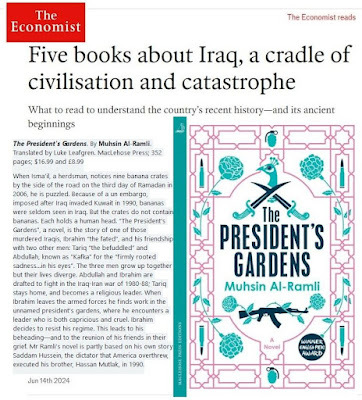
The President’s Gardens. By Muhsin Al-Ramli. Translated byLuke Leafgren. MacLehose Press; 352 pages; $16.99 and £8.99
When Isma’il, a herdsman, notices nine bananacrates by the side of the road on the third day of Ramadan in 2006, he ispuzzled. Because of a un embargo, imposed after Iraq invaded Kuwait in 1990,bananas were seldom seen in Iraq. But the crates do not contain bananas. Eachholds a human head. “The President’s Gardens”, a novel, is the story of one ofthose murdered Iraqis, Ibrahim “the fated”, and his friendship with two othermen: Tariq “the befuddled” and Abdullah, known as “Kafka” for the “firmlyrooted sadness…in his eyes”. The three men grow up together but their livesdiverge. Abdullah and Ibrahim are drafted to fight in the Iraq-Iran war of1980-88; Tariq stays home, and becomes a religious leader. When Ibrahim leavesthe armed forces he finds work in the unnamed president’s gardens, where heencounters a leader who is both capricious and cruel. Ibrahim decides to resisthis regime. This leads to his beheading—and to the reunion of his friends intheir grief. Mr Ramli’s novel is partly based on his own story: Saddam Hussein,the dictator that America overthrew, executed his brother, Hassan Mutlak, in 1990.
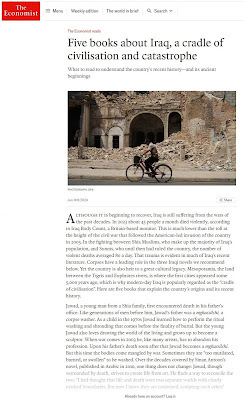
مجلةإيكونوميست الإنكليزية، تعتبر (حدائق الرئيس)، واحد من خمسة كتب ينصحبقراءتها لفهم تاريخ العراق: مهد الحضارة والكارثة
https://alramliarabic.blogspot.com/2024/07/blog-post.html
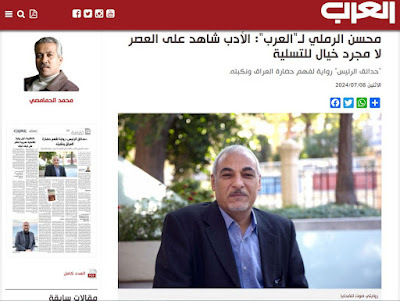
June 28, 2024
Iraqi Woman’s Voice and Revolt in Muhsin Al-Ramli’s story
Emporring Iraqi Woman’s Voice and Revolt
in Muhsin Al-Ramli ’s story
IKilled her Because I Loved her
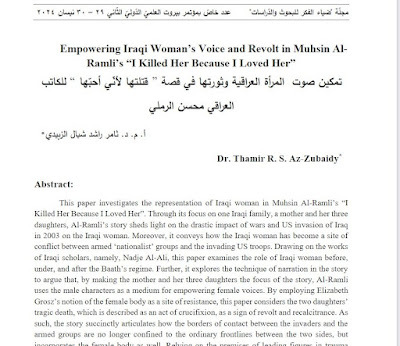
DR. Thamir Az-Zubaidy

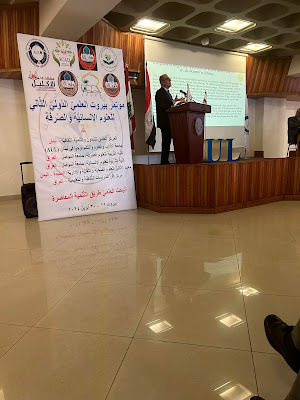
https://alramliarabic.blogspot.com/2024/06/blog-post_28.html
January 13, 2024
Books Written by Muhsin Al-Ramli

Muhsin Al-Ramli
https://riyadhrb.com/book-author/muhsin-al-ramli/
Muhsin Al-Ramli, an accomplished Iraqi writer, poet, academic, andtranslator, was born on March 7, 1967, in the village of Sudara in northernIraq. Since 1995. He has been residing in Madrid, Spain, where he madesignificant contributions to the field of literature, both as a writer and atranslator. He is notably recognized for his translation of the iconic Spanishclassic “Don Quixote” into Arabic, demonstrating his profound expertise inlanguages and literature.
Muhsin Al-Ramli’s academic journeymarked by his profound interest in the intersection of cultures. In 2003, hecompleted his Doctorate in Philosophy and Letters and Spanish Philology at theAutonomous University of Madrid, focusing his thesis on the influences ofIslamic culture in “Don Quixote.” This scholarly work showcases his deepengagement with cross-cultural studies and his dedication to exploring theconnections between diverse literary traditions.
As an educator, Al-Ramli impartshis knowledge and passion for literature at the Saint Louis University MadridCampus. He is also a pivotal figure in Arabic literary circles, serving as theeditor of Alwah, a magazine dedicated to Arabic literature and thought, whichhe co-founded. This platform reflects his commitment to promoting Arabicliterature and fostering intellectual discourse.
Al-Ramli’s literary contributionsencompass a wide array of genres, including novels, short stories, poetry, andtheatrical works.
MuhsinAl-Ramli’s Works:
“Gift from the Century to Come” (Short stories, 1995) “In Search of a Live Heart” (Theater, 1997) “Papers far from the Tigris” (Short stories, 1998) “Scattered Crumbs” (Novel, 2000) “The Happy Nights of the Bombing” (Narrative, 2003) “We Are All Widowers of the Answers” (Poetry, 2005) “Dates on My Fingers” (Novel, 2008) “Asleep among the Soldiers” (Poetry, 2011) “The Oranges Of Baghdad and Chinese Love” (Short stories, 2011) “The President’s Gardens” (Novel, 2012), which was longlisted for the International Prize for Arabic Fiction (IPAF) “The Wolf of Love and Books” (Novel, 2015) “Children and Shoes” (Novel, 2018) “Daughter of the Tigris” (Novel, 2019)Additionally, he has contributed tothe world of translation, notably with the Portuguese translation of “Laranjase giletes em Bagdá/Naranjas y cuchillas en Bagdad” by Fedra Rodríguez Hinojosa.His diverse body of work reflects a deep engagement with themes of culturalidentity, history, and the human condition, making him a prominent voice incontemporary Arabic literature.
ــــــــــــــــــــــــــــــــــــــــــــــــــــــ
The President’s Gardens
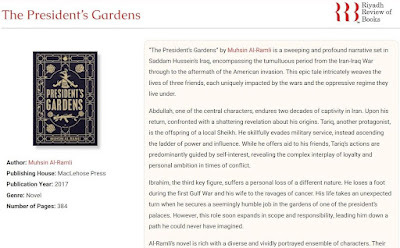
https://riyadhrb.com/book/the-presidents-gardens/
“ThePresident’s Gardens”by MuhsinAl-Ramli is a sweeping and profound narrative set in Saddam Hussein’sIraq, encompassing the tumultuous period from the Iran-Iraq War through to theaftermath of the American invasion. This epic tale intricately weaves the livesof three friends, each uniquely impacted by the wars and the oppressive regimethey live under.
Abdullah, one of the central characters, endures two decadesof captivity in Iran. Upon his return, confronted with a shattering revelationabout his origins. Tariq, another protagonist, is the offspring of a localSheikh. He skillfully evades military service, instead ascending the ladder ofpower and influence. While he offers aid to his friends, Tariq’s actions arepredominantly guided by self-interest, revealing the complex interplay ofloyalty and personal ambition in times of conflict.
Ibrahim, the third key figure, suffers a personal loss of adifferent nature. He loses a foot during the first Gulf War and his wife to theravages of cancer. His life takes an unexpected turn when he secures aseemingly humble job in the gardens of one of the president’s palaces. However,this role soon expands in scope and responsibility, leading him down a path hecould never have imagined.
Al-Ramli’s novel is rich with a diverse and vividlyportrayed ensemble of characters. Their interwoven stories echo the narrativestyle and thematic depth found in acclaimed works such as “The Kite Runner,”“The Yellow Birds,” and “One Hundred Years of Solitude.” “The President’sGardens” is not just a story about war and its aftermath; it delves deeply intothemes of oppression, love, marriage, familial bonds, and the human conditionunder a brutal, dictatorial regime.
Spanning over 400 pages, the novel is both an epichistorical account and a philosophical exploration, offering profound insightsinto the complexities of life during a period of extreme turmoil. Al-Ramli’smasterful storytelling captures the essence of human resilience and theenduring spirit in the face of adversity, making “The President’s Gardens” animpactful and enduring work of literature.
ــــــــــــــــــــــــــــــــــــــــــــــــــــــ
Daughter of the Tigris
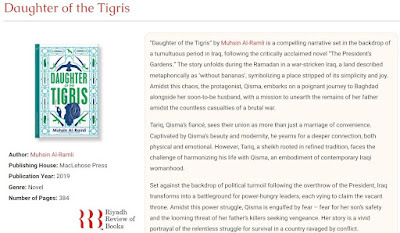
https://riyadhrb.com/book/daughter-of-the-tigris/
“Daughterof the Tigris” by MuhsinAl-Ramli is a compelling narrative set in the backdrop of a tumultuousperiod in Iraq, following the critically acclaimed novel “The President’sGardens.” The story unfolds during the Ramadan in a war-stricken Iraq, a landdescribed metaphorically as ‘without bananas’, symbolizing a place stripped ofits simplicity and joy. Amidst this chaos, the protagonist, Qisma, embarks on apoignant journey to Baghdad alongside her soon-to-be husband, with a mission tounearth the remains of her father amidst the countless casualties of a brutalwar.
Tariq, Qisma’s fiancé, sees their union as more than just amarriage of convenience. Captivated by Qisma’s beauty and modernity, he yearnsfor a deeper connection, both physical and emotional. However, Tariq, a sheikhrooted in refined tradition, faces the challenge of harmonizing his life withQisma, an embodiment of contemporary Iraqi womanhood.
Set against the backdrop of political turmoil following theoverthrow of the President, Iraq transforms into a battleground forpower-hungry leaders, each vying to claim the vacant throne. Amidst this powerstruggle, Qisma is engulfed by fear – fear for her son’s safety and the loomingthreat of her father’s killers seeking vengeance. Her story is a vividportrayal of the relentless struggle for survival in a country ravaged byconflict.
Qisma’s narrative is not just one of survival but also ofambition. Her aspirations to carve out a piece of Iraq for herself depict thehuman tendency to seek control in times of uncertainty. However, this ambition,likened to a perilous drug, could potentially lead to her undoing. “Daughter ofthe Tigris” is a tale of resilience, fear, and the consequences of ambition setin a nation scarred by war, where survival is a daily battle, and the quest forpower is a double-edged sword.
ــــــــــــــــــــــــــــــــــــــــــــــــــــــ
Dates on My Fingers

https://riyadhrb.com/book/dates-on-my-fingers/
“Dateson My Fingers,” anovel by MuhsinAl-Ramli, intricately weaves the narrative of Saleem. He is a young manfrom an Iraqi village who embarks on a transformative journey to Spain. Seekingrefuge from the violence and rigid societal norms of his homeland. Saleem’squest for a peaceful life is abruptly interrupted when he unexpectedlyencounters his father, Noah, in a Madrid nightclub. Noah’s presence, markedlydifferent in demeanor and appearance, ignites Saleem’s curiosity. Prompting himto unravel the mysteries surrounding his father’s new life in Spain.
The novel deftly transitions between Saleem’s present inSpain and his past in Iraq. Illuminating his deeply personal experiences offamilial love amidst the backdrop of war. A particularly poignant memory is thehaunting accidental death of his cousin Aliya, with whom Saleem sharedtentative steps towards understanding sexuality. These reflections are not onlypersonal reckonings but also a window into the broader societal challengesfaced in Iraq.
Saleem’s journey is marked by a tumultuous reconnection withhis father. Leading to a violent confrontation that compels him to reassess hisidentity and the delicate balance of his newfound stability. Al-Ramli’snarrative skillfully carries the reader between the contrasting worlds of Spainand Iraq. Culminating in a surprising and thought-provoking resolution.
Critically acclaimed, “Dates on My Fingers” offers a vividportrayal of an Iraq under oppression, transforming recent historical eventsinto universal stories that allow readers to draw their own conclusions andparallels. This fast-paced novel transcends geographical boundaries, delvinginto themes of youthful love, the aftermath of conflict, and the enduringsignificance of family honor.
Muhsin Al-Ramli, an Iraqi-born novelist, poet, translator,and academic, writes in both Arabic and Spanish. Exiled in 1993 due togovernmental persecution, which included the execution of his brother, Al-Ramlihas made Madrid his home. He is a professor at Saint Louis University and hastranslated several Spanish classics into Arabic. His literary works includeplays, poetry, short stories, and novels, with “Dates on My Fingers” beinglonglisted for the prestigious International Prize for Arabic Fiction. TheEnglish translation of this novel by Luke Leafgren, who learned Arabic duringhis PhD studies at Harvard University, is his first foray into translation,bringing Al-Ramli’s rich narrative to a broader audience.
ــــــــــــــــــــــــــــــــــــــــــــــــــــــ
Scattered Crumbs

https://riyadhrb.com/book/scattered-crumbs/
“ScatteredCrumbs,” authored byMuhsin Al-Ramli, is a poignant narrative set amidst the Iran-Iraq war in anIraqi village. The novel critiques life under oppressive rule, exploring theimpact of dictatorship and war on an Iraqi family. Al-Ramli vividly portraysconflicts intensified by political turmoil through this impoverished peasantfamily’s lens.
Central to thestory is a father, an ardent admirer of Saddam Hussein, known as “The Leader.”His fervent support for the dictatorship starkly contrasts with his son’s, anartist. The son’s love for his homeland is palpable, yet he faces a moral andartistic quandary. He cannot bring himself to paint the Leader’s portrait, asdemanded by his father. The ideological clash mirrors broader societalconflicts, symbolizing generational and intellectual rifts exacerbated by theregime.
A Taleof Identity, Exile, and Suffering in 1980s Iraq Amidst Dictatorship andConflictThe narrator, another crucial character, recounts thegradual disintegration of his family. Departing in search of his cousin, hereflects on the scant knowledge defined by his cousin’s absence. This journeysymbolizes a broader search for identity and belonging amidst the chaos of warand dictatorship.
“Scattered Crumbs,” originally published in Arabic in Cairoin 2000, has been masterfully translated to convey the original text’s subtlesarcasm and elliptical rhythms. Translator Yasir Suleiman brings to the forethe novel’s nuanced exploration of the deterioration of both the country andits people, who are swept into the maelstrom of political and social upheaval.
Al-Ramli’snarrative depicts exile’s harsh realities, driven by explosive forces. The painmirrors skin flaying for those trampled in their homeland. The novel stitchesmemories – Azawi’s café, Basra’s winged bull. Older generations cling, whileyounger ones, overwhelmed, seek refuge in succinct expressions. “ScatteredCrumbs,” set in 1980s Iraq, reflects profound suffering during dictatorship andconflict.
February 28, 2023
Top 10 List of Iraqi Fiction/ The Markaz
here are 10 books that will help further explore the diversity of Iraqi literature available in English right now.
The President’s Gardens by Muhsin Al-Ramli,
translated by Luke Leafgren
(MacLehose Press, 2017)
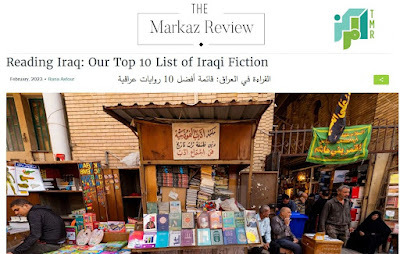
Set during the last fifty years of Iraqi history, this novel begins with a horrific morning. It is the third day of Ramadan and the village without bananas wakes up to find nine banana crates stacked by the bus stop, each with the severed head of one of its sons. One of them belonged to one of the most wanted men in Iraq, known to his friends as Ibrahim the Fated. The novel explores what it is that warrants such a gruesome ending. Described by Hassan Blasim, Iraqi author of The Iraqi Christ as “a contemporary tragedy of epic proportions,” the novel is masterfully woven from the miserable stories of the real people of Iraq, while highlighting resounding and universal concerns. Think One Hundred Years of Solitude meets The Kite Runner.
When the novel appeared in English in 2017, it was acclaimed by all critics and went on to win the 2018 Saif Ghobash Banipal Prize for Arabic Literary Translation. The translation of its sequel, Daughter of the Tigris (2019) was practically published at the same time as publication of the Arabic.
https://themarkaz.org/reading-iraq-our-top-10-list-of-iraqi-fiction/
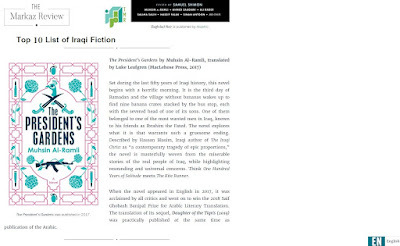
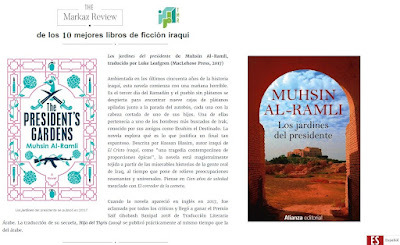
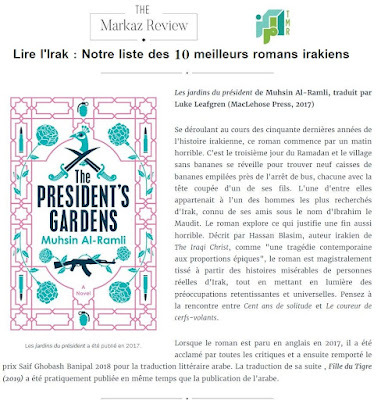
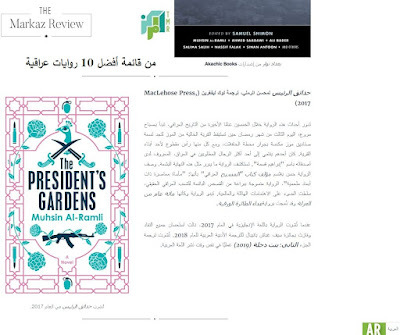
من عشرة كتب ستساعد في استكشاف تنوع الأدب العراقي المتوفر باللغة الإنجليزية في الوقت الحالي.
حدائق الرئيس لمحسن الرملي
ترجمة لوك ليفغرين (MacLehose Press, 2017)
تدور أحداث هذه الرواية خلال الخمسين عامًا الأخيرة من التاريخ العراقي، تبدأ بصباح مُرِّوع؛ اليوم الثالث من شهر رمضان حين تستيقظ القرية الخالية من الموز لتجد تسعة صناديق موز مكدسة بجوار محطة الحافلات، ومع كل منها رأس مقطوع لأحد أبناء القرية. كان أحدهم ينتمي إلى أحد أكثر الرجال المطلوبين في العراق، المعروف لدى أصدقائه باسم "إبراهيم قسمة". تستكشف الرواية ما يبرر مثل هذه النهاية البشعة. وصف الرواية حسن بلاسم مؤلف كتاب "المسيح العراقي" بأنها: "مأساة معاصرة ذات أبعاد ملحمية"، الرواية منسوجة ببراعة من القصص البائسة للشعب العراقي الحقيقي، سلطت الضوء على الاهتمامات الهائلة والعالمية. تبدو الرواية وكأنها مائة عام من العزلة وقد دُمجت برواية عداء الطائرة الورقية. عندما نُشرت الرواية باللغة الإنجليزية في العام 2017، نالت استحسان جميع النقاد وفازت بجائزة سيف غباش بانيبال للترجمة الأدبية العربية للعام 2018. نُشرت ترجمة الجزء الثاني: بنت دجلة(2019) عمليًا في نفس وقت نشر اللغة العربية.
https://themarkaz.org/ar/reading-iraq-our-top-10-list-of-iraqi-fiction/
February 27, 2023
Review: Dates on My Fingers. By: Azeez Jasim
A Book Review:
Is it ‘Dates on My Fingers’?
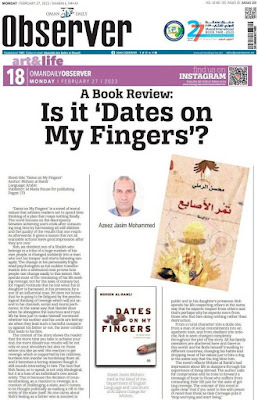
By: Azeez Jasim Mohammed
Novel title: “Dates on My Fingers”
Author: Muhsin Al-Ramli
Language: Arabic
Publisher: Al Mada House for publishing
Pages: 173
“Dates on My Fingers” is a novel of moral values that advises readers not to spend time thinking of a plan that reaps nothing finally. The novel focuses on the discrepancy between achieving one’s ends after consuming long time by harnessing all self-abilities and the quality of the results that one reaches afterwards. It gives a lesson that not all enjoyable actions leave good impression after they are over.
Noh, an obedient son of a Shaikh who belongs to a tribe of a huge number of his own people, is changed suddenly into a man who lost his temper and starts behaving savagely. The change in his personality frightened psychologists as his sudden transformation into a whimsical man proves how people can change easily to this extent. Noh spends most of the remaining of his life seeking revenge; not for the sake of ecstasy but for regain rectitude that he lost when his ill daughter is harassed, in his presence, by a son of an influential man. He does not know that he is going to be fatigued by the psychological thinking of revenge which will put an end to his clannish, social and moral pertinence. In the same way that Hamlet does when he abnegates the luxurious and royal life he lives just to make himself convinced whether his mother and his uncle are betrayals when they lead such a harmful conspiracy against his father or not, the inner conflict that leads to his fate.
The context of the story shows the reader that the more time you take to achieve your end, the more disastrous results will be not only on your shoulders but also on those whom you like as well. His reaction to get revenge, which is supported by his relatives, burdens him insofar as burdening them all and it becomes a boring mission though it still sounds interesting to him. The loss that Noh faces, so to speak, is not only ideological, but it is a loss of an individual’s own social entity. This is because the decision of counterattacking, as a reaction to revenge, is a conduct of challenging a state, and it comes to be thought politically as making a rift in the entity of the state itself. No one cares about Noh’s feeling as a father who is insulted in public and in his daughter’s presence. Noh spends his life respecting others in the same way that he expects respect from others and that’s perhaps why he expects more from those who find him doing nothing rather than destruction.
From a rural character into a dude one, from a man of social commitments into an apathetic man, and from obedient into indocile, Noh is seen changed completely throughout the plot of the story. All his family members are shattered here and there in this world, and he finds himself travelling to different countries, changing his habits and dropping most of his values just to bite a dog in the same way that the dog bites him.
The novel reflects Muhsin Al-Ramli’s bad impression about life in diaspora through his experience of living abroad. The author calls for compromise and he tries to forward a message of hope to those who suffers from consuming their life just for the sake of getting revenge. The concept of this novel is quite clear that if you want to live with peace of mind then think as Dale Carnegie puts it “stop worrying and start living.”
-------------------------------------------
*Published: Oman Observer. Feb 26,2023
https://www.omanobserver.om/pdf/2023/02/27/omandailyobserver-20230227-1.pdf?ts=221721
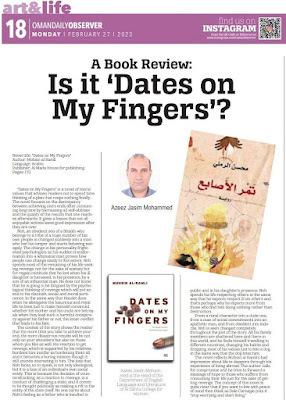
https://www.omanobserver.om/ampArticle/1133323
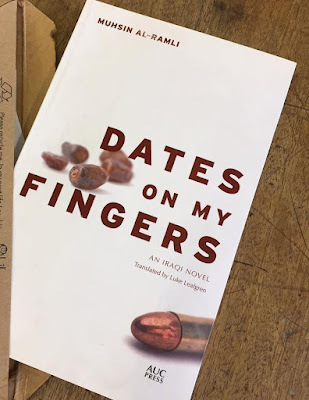 https://www.amazon.com/Dates-My-Fingers-Modern-Literature/dp/9774166442
https://www.amazon.com/Dates-My-Fingers-Modern-Literature/dp/9774166442
December 27, 2022
Conflicto Humano en La Novela del iraqu�� Muhsin Al-Ramli /Hanan Younus
���������� ������������ ���������������� ���� ���������� (������ ��������������)
���������� ������������
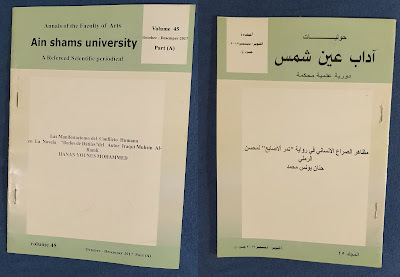
Las Manifestacionesdel Conflicto Humano
en La Novela "Dedos de D��tiles"
del autor iraqu��Muhsin Al-Ramli
�������� �������� ��������
Hanan Younus Mohammed
https://search.mandumah.com/Record/956303

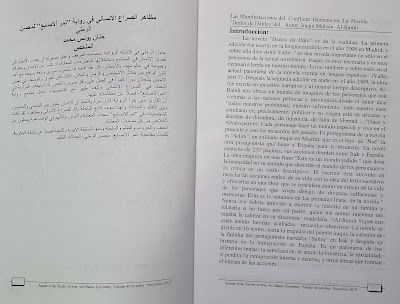
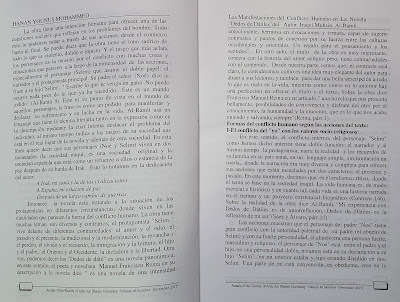
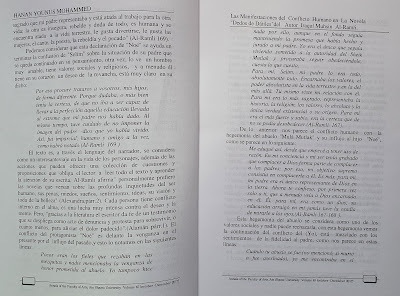

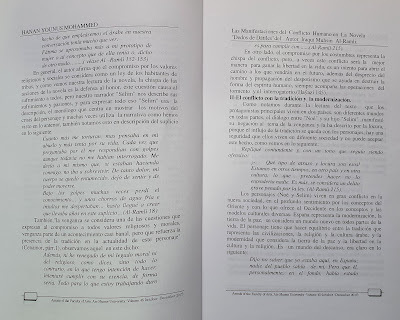
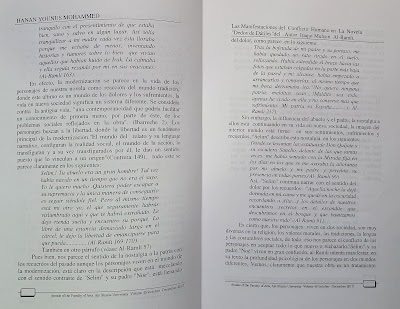
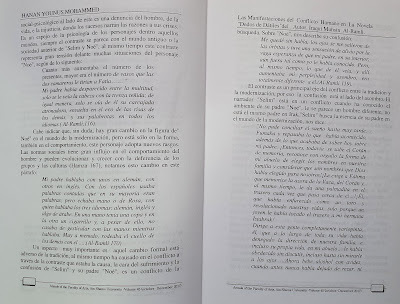
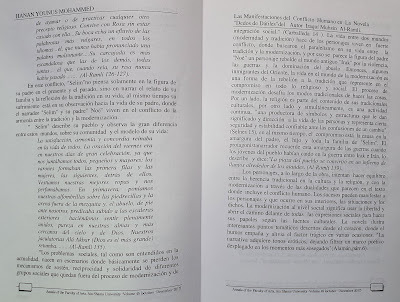
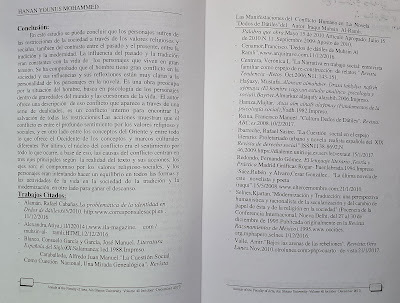
Al-Ramli intentaen sus obras narrativas, y por su sentimiento sensible y la profundidad de suconocimiento, atraer la atenci��n a las cuestiones del hombre en la sociedad ysus problemas que se mezclan con los sufrimientos, donde escribe sobre elhombre y sus sufrimientos y sus preocupaciones en un mundo amenazado por lasgravedades. ��l nos ofrece todo esto en un estilo narrativo, un simple lenguajey unas acciones de la realidad a trav��s de los personajes, el tiempo y ellugar. Tambi��n, en algunas veces el di��logo y la descripci��n ocupan un granpapel en la obra seg��n la necesidad del texto. El objeto del estudio esestablecer una b��squeda en el conflicto humano, y c��mo parece con lospersonajes dentro la sociedad de "Dedos de D��tiles", adem��s desus reflexiones a ellos. Cuando el lector lee esta novela en primera vez,observa que el hombre vive entre el pasado y el presente, entre la tradici��n yla modernidad, y por eso la investigadora va a seguir aquel conflicto humano ysus manifestaciones. Los personajes en la obra son prisioneros del sufrimientoy la tensi��n, pero, al mismo tiempo buscan la salvaci��n de todas las causas delsufrimiento: la violencia, las guerras, la injusticia, la autoridadpaternal-religiosa y adem��s de la del gobierno.
In his novelwritings, with his delicate sense and depth of vision, Al-Ramli tried to draw attentionto human issues in society and their problems to the sufferings. He wrote aboutman, his suffering and his concern in a world threatened by danger, and allthis presented to us in a narrative style and in simple language with one ofthe most precious realities through people, time and place. Dialogue anddescription sometimes also play a major part of the work in accordance with thenecessity of the text. The study was therefore aimed at examining the humanconflict and how it appeared with the characters within a community and thenovel ���Dates on My Fingers,��� as well as its implications on them.
The reader, while reading the novel for the firsttime, notices that man lives between the past and the present, betweentradition and modernity and that's why the researcher will pursue thathumanitarian conflict and its phenomena. The characters in the novel ���Dates onMy Fingers��� were prisoners of suffering and anxiety, but at the same time, theywere seeking salvation from all causes of suffering: violence, wars, injustice,power, including patriarchal and religious authority, as well as the governmentauthority.
This abstract translated by Dar AlMandumah Inc.2018
�������� ������������ ���� �������������� ���������������� �������������� ������������ �������� ������������ ������������ �������������� ������ ���������� �������������� ���� �������������� ������������������ �������������� ������ ������������������ ���������� ���� �������������� ���������������� ������������ ���� �������� �������� ������������������ ���� ������ �������� ������ �������������������� ���������� ���������� ���� ������ �������� ������������ ���� �������� �������������� �������������� ���������������� �������� ������������������ ������������ ���� ������ �������������� ������������ �������� ���������� ���� ���������� ������ ������ ���������� �������� �������������������� �������������� ������ ���������� ���� ������������ ���������������� �������� ������ ���� ���������������� �������� �������������������� "������ ��������������"�� �������� ���� ������������������ ����������.
���� ������������ ������ �������� �������������� �������� ������ ���������� ���� �������������� �������� ������������������ ���������������� �������� �������������� ����������������. ���������� ������ ���������� �������������� ������ ���������������������������� ���������������� ������ �������� ���������������� ���� "������ ��������������" ���������� �������������������������������� ������������ ���� ���������� �������� ������������ ���� ������������ ���� ���� ������������ ����������������: ������������������������ ������������ �������������� ���������� ������������ �������������� ���������������� �������� ���� �������� ��������������
Conflicto Humano en La Novela del iraquí Muhsin Al-Ramli /Hanan Younus
مظاهر الصراع الإنساني في رواية (تمر الأصابع)
لمحسن الرملي

Las Manifestaciones del Conflicto Humano
en La Novela "Dedos de Dátiles"
del autor iraquí Muhsin Al-Ramli
حنان يونس محمد
Hanan Younus Mohammed
https://search.mandumah.com/Record/956303










Al-Ramli intenta en sus obras narrativas, y por su sentimiento sensible y la profundidad de su conocimiento, atraer la atención a las cuestiones del hombre en la sociedad y sus problemas que se mezclan con los sufrimientos, donde escribe sobre el hombre y sus sufrimientos y sus preocupaciones en un mundo amenazado por las gravedades. Él nos ofrece todo esto en un estilo narrativo, un simple lenguaje y unas acciones de la realidad a través de los personajes, el tiempo y el lugar. También, en algunas veces el diálogo y la descripción ocupan un gran papel en la obra según la necesidad del texto. El objeto del estudio es establecer una búsqueda en el conflicto humano, y cómo parece con los personajes dentro la sociedad de "Dedos de Dátiles", además de sus reflexiones a ellos. Cuando el lector lee esta novela en primera vez, observa que el hombre vive entre el pasado y el presente, entre la tradición y la modernidad, y por eso la investigadora va a seguir aquel conflicto humano y sus manifestaciones. Los personajes en la obra son prisioneros del sufrimiento y la tensión, pero, al mismo tiempo buscan la salvación de todas las causas del sufrimiento: la violencia, las guerras, la injusticia, la autoridad paternal-religiosa y además de la del gobierno.
In his novel writings, with his delicate sense and depth of vision, Al-Ramli tried to draw attention to human issues in society and their problems to the sufferings. He wrote about man, his suffering and his concern in a world threatened by danger, and all this presented to us in a narrative style and in simple language with one of the most precious realities through people, time and place. Dialogue and description sometimes also play a major part of the work in accordance with the necessity of the text. The study was therefore aimed at examining the human conflict and how it appeared with the characters within a community and the novel “Dates on My Fingers,” as well as its implications on them.
The reader, while reading the novel for the first time, notices that man lives between the past and the present, between tradition and modernity and that's why the researcher will pursue that humanitarian conflict and its phenomena. The characters in the novel “Dates on My Fingers” were prisoners of suffering and anxiety, but at the same time, they were seeking salvation from all causes of suffering: violence, wars, injustice, power, including patriarchal and religious authority, as well as the government authority.
This abstract translated by Dar AlMandumah Inc. 2018
حاول الرملي في كتاباته الروائية بإحساسه المرهف وعمق بصيرته أن يجذب الأنظار إلى قضايا الإنسان في المجتمع ومشكلاتها لتيامتز جتب المعاناة، إذ كتب عن الإنسان ومعاناته وهمومه في عالم مهدد بالأخطار، كل هذا قدمه لنا بأسلوب سردي وبلغة بسيطة مع أحد أثمن الواقع من خلال الأشخاص والزمان والمكان، كذلك كان الحوار والوصف في بعض الأحيان يشغلان دورا كبيرا في العمل على وفق ضرورة النص لذا استهدفت الدراسة إلى البحث في الصراع الإنساني وكيف ظهر مع الشخصيات داخل مجتمع وراية "تمر الأصابع"، فضلا عن انعكاساته عليها.
أن القارئ حين يقرأ الرواية لأول مرة يلاحظ أن الإنسان يعيش بين الماضي والحاضر، وبين التقليد والحداثة. ولهذا سوف تتابع الباحثة ذلك الصراع الإنساني ومظاهرة، لقد كانت الشخصيات في "تمر الأصابع" سجناء المعاناة والتوتر، ولكنهم في الوقت نفسه يبحثون عن الخلاص من كل مسببات المعاناة: العنف والحروب والظلم والسلطة ومنها السلطة الأبوية والدينية فضلا عن سلطة الحكومة
November 16, 2022
Literatura iraqu�� / Elige libro
Los jardines del presidente
Es unahistoria de muerte, amor y amistad
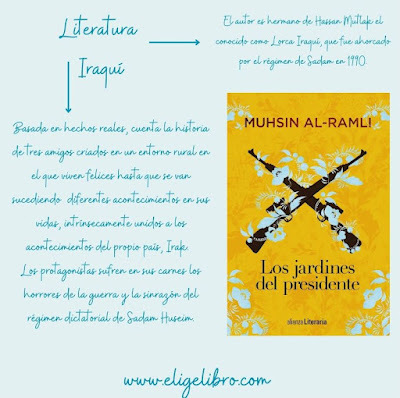
por: Nagore P��rez
Podr��a decir que esta novela me hasacado de ��mi zona de confort lectora�� no solo por diferente sino porque impelea la reflexi��n, me ha ense��ado mucho sobre Irak, sobre sus gentes y costumbresy adem��s es bastante entretenida, dentro de la extrema dureza de sus p��ginas.
El libro es una sucesi��n de momentosamargos y crudos y no es para menos teniendo en cuenta que recorre la historiade Irak en sus ��ltimos cincuenta a��os. Cincuenta a��os repletos de cruentasguerras, empezando por la guerra con Ir��n, pasando por la guerra del golfo trasla invasi��n de Kuwait, hasta la invasi��n de Irak por parte de una alianza denaciones encabezada por Estados Unidos.
La historia se cuenta desde el prisma de tresinseparables amigos de la infancia Tarek, Abdul�� Kafka e Ibrahim, criados en unentorno rural en el que viven felices hasta que se van sucediendo losdiferentes acontecimientos en sus vidas, intr��nsecamente unidos a losacontecimientos del propio pa��s. Uno de ellos sufre las torturas de larep��blica isl��mica de Ir��n, otro ser�� mutilado en la guerra de Kuwait��� endefinitiva los protagonistas sufren en sus carnes los horrores de la guerra yla sinraz��n del r��gimen dictatorial de Sadam Husein.
La novela termina en 2006, tras elderrocamiento de Sadam, y pareciera que al cerrar la ��ltima p��gina se cerrarala historia de horror de Irak. Sin embargo, nunca fue as��, la calma y la paz noconsiguen posarse en Irak, menos ahora que ha aparecido en escena el EstadoIsl��mico y despu��s de acabar con la vida de miles de civiles tieneaterrorizados a los iraqu��es (entre otros).
El autor Muhsin Al-Ramli @alramlimuhsin, merece una menci��n para aquellos que como en mi caso no loconozc��is. Se trata de uno de los m��s prestigiosos escritores de Irak, aunquelleva a��os residiendo en Madrid. Nadie mejor que ��l, exiliado del pa��s yperseguido por el r��gimen puede apuntalar la historia que cuenta. Su hermano,Hassan Mutlak (el conocido como Lorca Iraqu��) fue ahorcado por el r��gimen deSadam en 1990.
Es una historia dif��cil, pero merecela pena leerla, no es solo una historia de muerte, es sobre todo una historiade amor y de amistad.
https://www.instagram.com/p/ClB-QYmtqS4/?hl=es
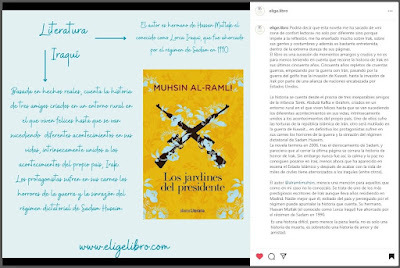
Muhsin Al-Ramli's Blog
- Muhsin Al-Ramli's profile
- 82 followers



